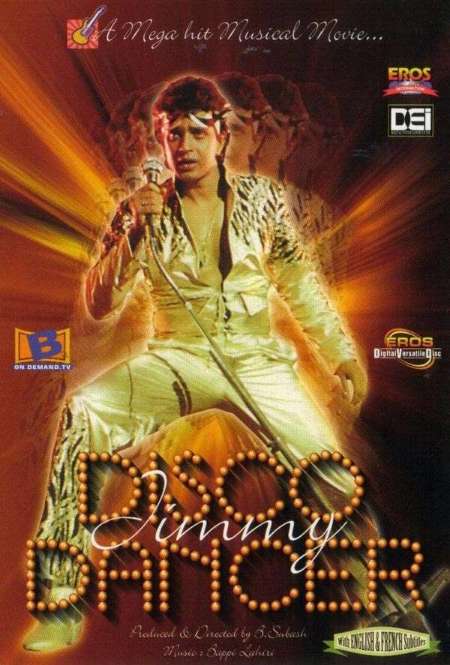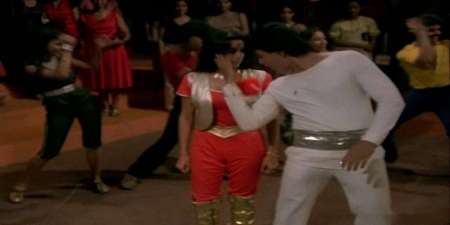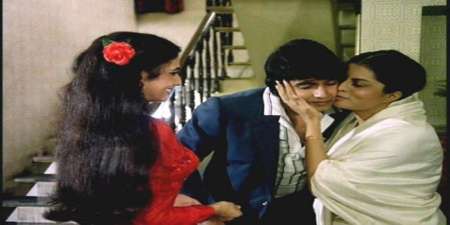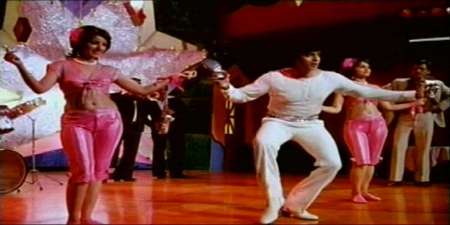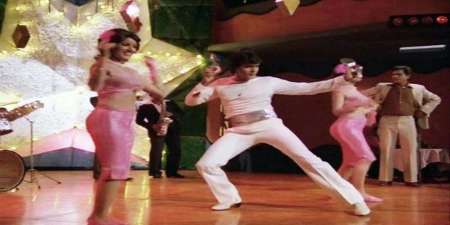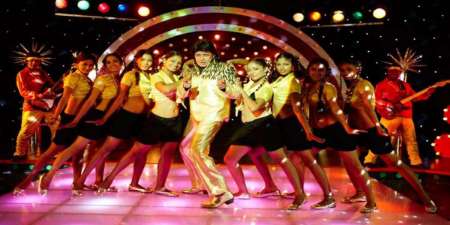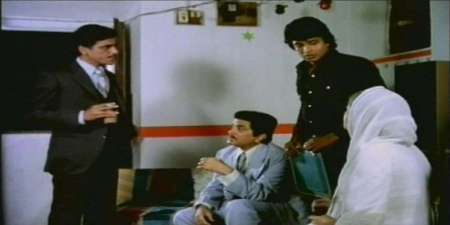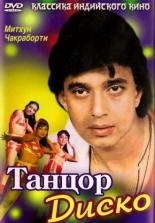From Wikipedia, the free encyclopedia
| Disco Dancer | |
|---|---|

Theatrical release poster |
|
| Directed by | Babbar Subhash |
| Written by | Dr. Rahi Masoom Reza Deepak Balraj Vij |
| Produced by | Babbar Subhash |
| Starring | Mithun Chakraborty Kim Rajesh Khanna |
| Cinematography | Nadeem Khan |
| Edited by | Mangesh Chavan Shyam Gupte |
| Music by | Bappi Lahiri |
|
Production |
B. Subhash Movie Unit |
|
Release date |
|
|
Running time |
135 minutes |
| Country | India |
| Language | Hindi |
| Box office | 100.68 crore |
Disco Dancer is a 1982 Indian dance film, written by Rahi Masoom Raza and directed by Babbar Subhash. It stars Mithun Chakraborty and Kim in leading roles, with Om Puri, Gita Siddharth and Karan Razdan in supporting roles with Rajesh Khanna in a friendly appearance.
The film tells the rags-to-riches story of a young street performer from the slums of Bombay. The film is known for its filmi disco Bollywood songs, composed by Bappi Lahiri and written by Anjaan and Faruk Kaiser. Popular songs include «Jimmy Jimmy Jimmy Aaja» sung by Parvati Khan, «I am a Disco Dancer» sung by Vijay Benedict, «Yaad Aa Raha Hai» sung by Bappi Lahiri, and «Goro Ki Na Kaalo Ki» sung by Suresh Wadkar with Usha Mangeshkar.
The film was a worldwide success, with its popularity extending across Asia, the Soviet Union, Eastern Europe, the Middle East, Turkey, and Africa. Disco Dancer was also the second highest-grossing film ever in the Soviet Union and the highest-grossing foreign film. Disco Dancer established Mithun as a household name across South Asia and the Soviet Union and many countries in Africa where Jimmy has become a more popular name for Mithun Chakraborty. The soundtrack album was also a success, having gone Platinum in India and received a Gold Award in China. Adjusted for inflation, it is still one of the highest-grossing Indian films of all time.
Plot[edit]
Anil, a street performer and wedding singer from the slums of Bombay, is scarred by the memory of the rich P. N. Oberoi beating his mother in an incident during his childhood. When manager David Brown is fed up with the tantrums of current Indian disco champion Sam and looks for some new talent, he happens to see Anil dance-walking across a street. Rebranded as ‘Jimmy’, the rising disco star must take the throne from Sam and win the heart of Rita, Oberoi’s daughter.
All seems to be going well until Oberoi hires men to connect Jimmy’s electric guitar to 5,000 volts of electricity, causing Jimmy’s mother to die in a tragic accident. Jimmy gets guitar phobia after witnessing his mother’s death. Later, Oberoi’s goons break his legs. With help from Rita, Jimmy begins to walk.
Jimmy must claim first place for Team India at the International Disco Dancing Competition amidst strong competition from Team Africa (Disco King and Queen) and Paris (Disco King and Queen). Jimmy is reluctant to dance, but Rita persuades him to do so. Sam arrives with a guitar to scare Jimmy. Rita manages to drag the show to encourage Jimmy to sing but to no avail. The crowd pelts him with stones which hit his head. Jimmy’s uncle Raju arrives and advises him to infuse his mother and his music; he throws the guitar to Jimmy, after which Jimmy begins to sing. Oberoi’s goons kill Raju, after which Jimmy travels to their lair and beats them up. In the ensuing fight, Oberoi is electrocuted.
Cast[edit]
- Mithun Chakraborty as Anil / Jimmy
- Kim as Rita Oberoi
- Rajesh Khanna as Master Raju
- Om Puri as David Brown
- Om Shivpuri as P.N. Oberoi
- Gita Siddharth as Radha
- Karan Razdan as Sam
- Yusuf Khan as Vasco
- Bob Christo as a Russian goon
- Kalpana Iyer as Nikki Brown
- Master Chhotu as younger Anil
- Baby Pinky as younger Rita
Production[edit]
The title song I am a Disco Dancer was shot at Natraj Studio in Mumbai over three days, where scenes featuring Mithun Chakrobarty’s signature moves were filmed. Thereafter, the shooting featured crowds scenes at Filmistan Studio in Mumbai.[1]
Soundtrack[edit]
| Disco Dancer | |
|---|---|
| Soundtrack album by
Bappi Lahiri |
|
| Released | 1982 |
| Genre | Bollywood, Disco, EDM |
| Language | Hindustani |
| Producer | Bappi Lahiri |
The music for all the songs[2] were composed by Bappi Lahiri and the lyrics were penned by Anjaan and Faruk Kaiser. The tracks on the 1982 soundtrack album are as follows:
The song «Yaad Aa Raha Hai» has been described as a synthesized, minimalist, high-tempo, electronic disco song. Geeta Dayal described it as a «disco anthem for the ages, and one of the best songs Lahiri ever did.»
The song «Jimmy Jimmy Jimmy Aaja» has similarities to 1980 French disco song «T’es OK» by Ottawan. The song «Auva Auva» (picturized on Karan Razdan’s character Sam) was inspired by the 1979 synthpop hit «Video Killed the Radio Star» by The Buggles. The song «Cerrone’s Paradise» by Cerrone was used in the scene when David Brown discovers Anil who is dance-walking down a street. The song «Krishna Dharti Pe Aaja Tu» was inspired by «Jesus» by Tielman Brothers. This version was used in the movie where Jimmy is practicing dance.
The Disco Dancer soundtrack was popular worldwide, particularly in India, the Soviet Union, and China.[3] The soundtrack went Platinum in India,[4] equivalent to 1 million sales,[5] and received a Gold Award in China.[3]
Box office[edit]
| Territory | Gross revenue | Inflation-adjusted gross revenue (2016) | Footfalls |
|---|---|---|---|
| Domestic (India) | ₹6.4 crore[6] (US$6.54 million)[n 1] | ₹105 crore (US$13 million) | 15 million[8] |
| Overseas (Soviet Union) | 60 million Rbls[9] – US$75.85 million[n 2] (₹94.28 crore)[n 3] | US$198 million (₹1,176 crore)[12] | 120 million[9] |
| Worldwide | ₹100.68 crore (US$106 million)[13][14] | ₹1,261 crore (US$189 million) | 135 million |
In India, the film grossed ₹6.4 crore in 1982.[6] It was the 7th[15] or 14th[6] highest-grossing film at the domestic Indian box office in 1982, with its strongest commercial performance in the West Bengal state,[6] home to actor Mithun Chakraborty and composer Bappi Lahiri.
In the Soviet Union, the film released in 1984, with 1,013 prints.[16] It drew an audience of 60.9 million viewers in 1984, becoming the most successful film at the Soviet box office that year,[17] the biggest foreign hit in the 1980s,[16] the fourth biggest box office hit of the decade,[16][18] the eighth biggest foreign hit of all time,[16] and one of the top 25 biggest box office hits of all time.[16][18] Including re-runs, the film sold an estimated 120 million tickets in the Soviet Union.[9] In terms of gross revenue, it earned 60 million Soviet rubles[9] (US$75.85 million,[n 2] ₹94.28 crore),[n 3] the highest for an Indian film, surpassing Awaara‘s 29 million roubles.[17] This made it the highest-grossing Indian film overseas up until it was surpassed by the over ₹100 crore overseas gross of My Name is Khan (2010)[19] and 3 Idiots (2009).[20][21]
Disco Dancer was also a success in China, when it released there in 1983.[22] The song «Jimmy Jimmy» was popular there. According to Aamir Khan, Mithun Chakraborty is famous in China due to the song.[23]
Worldwide, Disco Dancer grossed a combined ₹100.68 crore (US$82.39 million) in India and the Soviet Union. This surpassed the ₹35 crore gross of Sholay (1975),[24] making Disco Dancer the highest-grossing Indian film worldwide up until it was surpassed by the ₹135 crore gross of Hum Aapke Hain Koun (1994).[25] Disco Dancer was the first Indian film to gross ₹100 crore worldwide.[26]
Remakes[edit]
It was remade in Tamil as Paadum Vaanampadi with Anand Babu, and in Telugu as Disco King with Nandamuri Balakrishna.
Legacy[edit]
Upon release, Disco Dancer was a phenomenon, both domestically and internationally. Prior to the film’s release, Bollywood was dominated by «angry young man» Bombay underworld films, an action crime film genre pioneered by screenwriter duo Salim–Javed a decade earlier in the early 1970s. These films often explored socialist and «hero versus system» themes, often presented a poor hero’s journey from rags-to-riches, and involved violent revenge plots against villains. Disco Dancer took the «angry young man» genre and subverted it: instead of having Jimmy fight the villains or get revenge through violence, he instead gets revenge and defeats the villains through disco dancing. This led to a wave of disco-themed Bollywood musicals in India, and it become a global phenomenon outside of India. It was a blockbuster in Asia and the former Soviet Union, and drew a large global cult following, from Japan where a Jimmy statue was built in Osaka, to the West where Disco Dancer became the defining example of a stereotypical «Bollywood» film. Retrospectively, the film has received a polarizing critical reception, with praise for its music and dance numbers but criticism towards its plot, with Anuvab Pal calling it an ironic comedy film.[27][28]
Popular culture[edit]
The title song «I Am a Disco Dancer» was the inspiration for Devo’s song «Disco Dancer» (1988).
The British Sri Lankan alternative rapper M.I.A. covered «Jimmy Jimmy Jimmy Aaja» as «Jimmy» in 2007 for her album Kala. There have been cover versions of «Jimmy Jimmy Aaja Aaja» from other international musicians, including the 1998 hit «Jimmy» by Russian techno group Ruki Vverh, «Jimmy Jimmy» by Russian artists DJ Slon and Angel-A, and a cover version by Tibetan artist Kelsang Metok.
The music from «Jimmy Jimmy Aaja Aaja» was used in the final fight scene in the Adam Sandler film You Don’t Mess with the Zohan.[29]
In 2010, the songs «I Am a Disco Dancer» and «Yaad Aa Raha Hai» were used in the 2010 Bollywood comedy film, Golmaal 3, directed by Rohit Shetty. The songs were relevant to the performance of Mithun Chakraborty’s character Pritam, who reflected on his past as a young mega-hit disco dancer.
Aamir Khan’s special appearance as Disco Fighter in the Imran Khan starrer 2011 film Delhi Belly is inspired by Mithun Chakraborty’s role in Disco Dancer.
«Jimmy Jimmy Aaja Aaja» and «I Am a Disco Dancer» are very popular in countries such as Mongolia and post-Soviet states such as Russia, Azerbaijan, and Uzbekistan.[citation needed]
Baimurat Allaberiyev, an ethnic Uzbek from Tajikistan, became an internet sensation by singing «Goron Ki Na Kalon Ki» and «Jimmy Aaja» in a warehouse. The 2008 video recorded on a mobile phone got over 1 million views on YouTube. He landed an acting role in a Russian comedy film, Six Degrees of Celebration (2010).
The film’s soundtrack was used during the end credits of the 2019 Tamil film Super Deluxe.[30]
See also[edit]
- 100 Crore Club
- List of highest-grossing Indian films
- List of highest-grossing Indian films in overseas markets
- List of highest-grossing films in the Soviet Union
Notes[edit]
- ^ 9.79 Indian rupees per US dollar in 1982[7]
- ^ a b 0.791 Rbl per US dollar in 1984[10]
- ^ a b 12.43 Indian rupees per US dollar in 1984[11]
References[edit]
- ^ «On a disco high!». Pune Mirror. Retrieved 29 April 2014.
- ^ «Disco Dancer : Lyrics and video of Songs from the Movie Disco Dancer (1982)».
- ^ a b Global Bollywood: Travels of Hindi Song and Dance, page 88, University of Minnesota Press, 2008
- ^ «Bappi Lahiri: The golden era of music has ended». Gulf News. 17 July 2014.
- ^ «International». Billboard. Vol. 93, no. 28. Nielsen Business Media. 18 July 1981. p. 69.
- ^ a b c d Box Office 1982, Box Office India
- ^ Monthly Commentary on Indian Economic Conditions, Volume 28, page xv, Indian Institute of Public Opinion, 1986
- ^ Mittal, Ashok (1995). Cinema Industry in India: Pricing and Taxation. Indus Publishing. p. 71. ISBN 9788173870231.
- ^ a b c d Naralenkova, Oxana (10 September 2009). «Bollywood returns to Russian screens». Russia Beyond. Retrieved 25 May 2020.
- ^ Archive of Bank of Russia http://cbr.ru/currency_base/OldDataFiles/USD.xls
- ^ «Reserve Bank of India — Publications».
- ^ «67.175856 INR per USD in 2016». Archived from the original on 13 July 2017. Retrieved 18 June 2017.
- ^ «On Independence Day, here are the most successful Indian movies of every decade since 1947». Hindustan Times. 15 August 2018.
- ^ «Official exchange rate (LCU per US$, period average)». World Bank. Retrieved 13 December 2018.
- ^ «Worth their weight in gold». Box Office India. Archived from the original on 14 June 2017. Retrieved 12 June 2017.
- ^ a b c d e Sergey Kudryavtsev. «Зарубежные фильмы в советском кинопрокате».
- ^ a b Indian Films in Soviet Cinemas: The Culture of Movie-going After Stalin, page 211, Indiana University Press, 2005
- ^ a b Sergey Kudryavtsev. «Отечественные фильмы в советском кинопрокате».
- ^ Singh, Shivaji (23 July 2016). ««Which Khan Is The Real Box Office King of Bollywood?»«. Koimoi. Retrieved 24 July 2016.
- ^ «3 Idiots Is Biggest Grosser Overseas». Archived from the original on 25 October 2017. Retrieved 15 June 2017.
- ^ «Three Idiots Creates History In China». 30 December 2011. BoxOfficeIndia.Com. Archived from the original on 7 January 2012. Retrieved 30 December 2011.
{{cite web}}: CS1 maint: bot: original URL status unknown (link) - ^ «印度片現在這麼火也不是沒有原因的». Xuehua. 7 April 2018. Retrieved 6 March 2019.
- ^ «Aamir: I couldn’t really enjoy the food in China». Rediff. 21 May 2015.
- ^ http://smartinvestor.business-standard.com/market/ipoNews-418220-Top_10_biggest_commercial_hits_of_Amitabh_Bachchan.htm
- ^ «Top Worldwide Grossers ALL TIME: 37 Films Hit 100 Crore». Box Office India. Archived from the original on 22 July 2013. Retrieved 20 December 2012.
- ^ Cain, Rob (2 October 2017). «For Indian Movies, 1,000 Crore Rupees Is The New 100». Forbes.
- ^ Pal, Anuvab (2011). Disco Dancer : A Comedy In Five Acts. HarperCollins Publishers India. ISBN 978-93-5029-024-8.
- ^ Dixit, Shubhra (17 June 2015). «Angry Young Man in a Dance-Off: The Cult of ‘Disco Dancer’«. The Quint. Retrieved 5 June 2020.
- ^ You Don’t Mess with the Zohan#Soundtrack
- ^ Shekhar, Anjana (6 April 2019). «Addicted to old songs that appeared in ‘Super Deluxe’? Here’s your playlist». The News Minute. Retrieved 16 November 2019.
External links[edit]
- Disco Dancer at IMDb
From Wikipedia, the free encyclopedia
| Disco Dancer | |
|---|---|

Theatrical release poster |
|
| Directed by | Babbar Subhash |
| Written by | Dr. Rahi Masoom Reza Deepak Balraj Vij |
| Produced by | Babbar Subhash |
| Starring | Mithun Chakraborty Kim Rajesh Khanna |
| Cinematography | Nadeem Khan |
| Edited by | Mangesh Chavan Shyam Gupte |
| Music by | Bappi Lahiri |
|
Production |
B. Subhash Movie Unit |
|
Release date |
|
|
Running time |
135 minutes |
| Country | India |
| Language | Hindi |
| Box office | 100.68 crore |
Disco Dancer is a 1982 Indian dance film, written by Rahi Masoom Raza and directed by Babbar Subhash. It stars Mithun Chakraborty and Kim in leading roles, with Om Puri, Gita Siddharth and Karan Razdan in supporting roles with Rajesh Khanna in a friendly appearance.
The film tells the rags-to-riches story of a young street performer from the slums of Bombay. The film is known for its filmi disco Bollywood songs, composed by Bappi Lahiri and written by Anjaan and Faruk Kaiser. Popular songs include «Jimmy Jimmy Jimmy Aaja» sung by Parvati Khan, «I am a Disco Dancer» sung by Vijay Benedict, «Yaad Aa Raha Hai» sung by Bappi Lahiri, and «Goro Ki Na Kaalo Ki» sung by Suresh Wadkar with Usha Mangeshkar.
The film was a worldwide success, with its popularity extending across Asia, the Soviet Union, Eastern Europe, the Middle East, Turkey, and Africa. Disco Dancer was also the second highest-grossing film ever in the Soviet Union and the highest-grossing foreign film. Disco Dancer established Mithun as a household name across South Asia and the Soviet Union and many countries in Africa where Jimmy has become a more popular name for Mithun Chakraborty. The soundtrack album was also a success, having gone Platinum in India and received a Gold Award in China. Adjusted for inflation, it is still one of the highest-grossing Indian films of all time.
Plot[edit]
Anil, a street performer and wedding singer from the slums of Bombay, is scarred by the memory of the rich P. N. Oberoi beating his mother in an incident during his childhood. When manager David Brown is fed up with the tantrums of current Indian disco champion Sam and looks for some new talent, he happens to see Anil dance-walking across a street. Rebranded as ‘Jimmy’, the rising disco star must take the throne from Sam and win the heart of Rita, Oberoi’s daughter.
All seems to be going well until Oberoi hires men to connect Jimmy’s electric guitar to 5,000 volts of electricity, causing Jimmy’s mother to die in a tragic accident. Jimmy gets guitar phobia after witnessing his mother’s death. Later, Oberoi’s goons break his legs. With help from Rita, Jimmy begins to walk.
Jimmy must claim first place for Team India at the International Disco Dancing Competition amidst strong competition from Team Africa (Disco King and Queen) and Paris (Disco King and Queen). Jimmy is reluctant to dance, but Rita persuades him to do so. Sam arrives with a guitar to scare Jimmy. Rita manages to drag the show to encourage Jimmy to sing but to no avail. The crowd pelts him with stones which hit his head. Jimmy’s uncle Raju arrives and advises him to infuse his mother and his music; he throws the guitar to Jimmy, after which Jimmy begins to sing. Oberoi’s goons kill Raju, after which Jimmy travels to their lair and beats them up. In the ensuing fight, Oberoi is electrocuted.
Cast[edit]
- Mithun Chakraborty as Anil / Jimmy
- Kim as Rita Oberoi
- Rajesh Khanna as Master Raju
- Om Puri as David Brown
- Om Shivpuri as P.N. Oberoi
- Gita Siddharth as Radha
- Karan Razdan as Sam
- Yusuf Khan as Vasco
- Bob Christo as a Russian goon
- Kalpana Iyer as Nikki Brown
- Master Chhotu as younger Anil
- Baby Pinky as younger Rita
Production[edit]
The title song I am a Disco Dancer was shot at Natraj Studio in Mumbai over three days, where scenes featuring Mithun Chakrobarty’s signature moves were filmed. Thereafter, the shooting featured crowds scenes at Filmistan Studio in Mumbai.[1]
Soundtrack[edit]
| Disco Dancer | |
|---|---|
| Soundtrack album by
Bappi Lahiri |
|
| Released | 1982 |
| Genre | Bollywood, Disco, EDM |
| Language | Hindustani |
| Producer | Bappi Lahiri |
The music for all the songs[2] were composed by Bappi Lahiri and the lyrics were penned by Anjaan and Faruk Kaiser. The tracks on the 1982 soundtrack album are as follows:
The song «Yaad Aa Raha Hai» has been described as a synthesized, minimalist, high-tempo, electronic disco song. Geeta Dayal described it as a «disco anthem for the ages, and one of the best songs Lahiri ever did.»
The song «Jimmy Jimmy Jimmy Aaja» has similarities to 1980 French disco song «T’es OK» by Ottawan. The song «Auva Auva» (picturized on Karan Razdan’s character Sam) was inspired by the 1979 synthpop hit «Video Killed the Radio Star» by The Buggles. The song «Cerrone’s Paradise» by Cerrone was used in the scene when David Brown discovers Anil who is dance-walking down a street. The song «Krishna Dharti Pe Aaja Tu» was inspired by «Jesus» by Tielman Brothers. This version was used in the movie where Jimmy is practicing dance.
The Disco Dancer soundtrack was popular worldwide, particularly in India, the Soviet Union, and China.[3] The soundtrack went Platinum in India,[4] equivalent to 1 million sales,[5] and received a Gold Award in China.[3]
Box office[edit]
| Territory | Gross revenue | Inflation-adjusted gross revenue (2016) | Footfalls |
|---|---|---|---|
| Domestic (India) | ₹6.4 crore[6] (US$6.54 million)[n 1] | ₹105 crore (US$13 million) | 15 million[8] |
| Overseas (Soviet Union) | 60 million Rbls[9] – US$75.85 million[n 2] (₹94.28 crore)[n 3] | US$198 million (₹1,176 crore)[12] | 120 million[9] |
| Worldwide | ₹100.68 crore (US$106 million)[13][14] | ₹1,261 crore (US$189 million) | 135 million |
In India, the film grossed ₹6.4 crore in 1982.[6] It was the 7th[15] or 14th[6] highest-grossing film at the domestic Indian box office in 1982, with its strongest commercial performance in the West Bengal state,[6] home to actor Mithun Chakraborty and composer Bappi Lahiri.
In the Soviet Union, the film released in 1984, with 1,013 prints.[16] It drew an audience of 60.9 million viewers in 1984, becoming the most successful film at the Soviet box office that year,[17] the biggest foreign hit in the 1980s,[16] the fourth biggest box office hit of the decade,[16][18] the eighth biggest foreign hit of all time,[16] and one of the top 25 biggest box office hits of all time.[16][18] Including re-runs, the film sold an estimated 120 million tickets in the Soviet Union.[9] In terms of gross revenue, it earned 60 million Soviet rubles[9] (US$75.85 million,[n 2] ₹94.28 crore),[n 3] the highest for an Indian film, surpassing Awaara‘s 29 million roubles.[17] This made it the highest-grossing Indian film overseas up until it was surpassed by the over ₹100 crore overseas gross of My Name is Khan (2010)[19] and 3 Idiots (2009).[20][21]
Disco Dancer was also a success in China, when it released there in 1983.[22] The song «Jimmy Jimmy» was popular there. According to Aamir Khan, Mithun Chakraborty is famous in China due to the song.[23]
Worldwide, Disco Dancer grossed a combined ₹100.68 crore (US$82.39 million) in India and the Soviet Union. This surpassed the ₹35 crore gross of Sholay (1975),[24] making Disco Dancer the highest-grossing Indian film worldwide up until it was surpassed by the ₹135 crore gross of Hum Aapke Hain Koun (1994).[25] Disco Dancer was the first Indian film to gross ₹100 crore worldwide.[26]
Remakes[edit]
It was remade in Tamil as Paadum Vaanampadi with Anand Babu, and in Telugu as Disco King with Nandamuri Balakrishna.
Legacy[edit]
Upon release, Disco Dancer was a phenomenon, both domestically and internationally. Prior to the film’s release, Bollywood was dominated by «angry young man» Bombay underworld films, an action crime film genre pioneered by screenwriter duo Salim–Javed a decade earlier in the early 1970s. These films often explored socialist and «hero versus system» themes, often presented a poor hero’s journey from rags-to-riches, and involved violent revenge plots against villains. Disco Dancer took the «angry young man» genre and subverted it: instead of having Jimmy fight the villains or get revenge through violence, he instead gets revenge and defeats the villains through disco dancing. This led to a wave of disco-themed Bollywood musicals in India, and it become a global phenomenon outside of India. It was a blockbuster in Asia and the former Soviet Union, and drew a large global cult following, from Japan where a Jimmy statue was built in Osaka, to the West where Disco Dancer became the defining example of a stereotypical «Bollywood» film. Retrospectively, the film has received a polarizing critical reception, with praise for its music and dance numbers but criticism towards its plot, with Anuvab Pal calling it an ironic comedy film.[27][28]
Popular culture[edit]
The title song «I Am a Disco Dancer» was the inspiration for Devo’s song «Disco Dancer» (1988).
The British Sri Lankan alternative rapper M.I.A. covered «Jimmy Jimmy Jimmy Aaja» as «Jimmy» in 2007 for her album Kala. There have been cover versions of «Jimmy Jimmy Aaja Aaja» from other international musicians, including the 1998 hit «Jimmy» by Russian techno group Ruki Vverh, «Jimmy Jimmy» by Russian artists DJ Slon and Angel-A, and a cover version by Tibetan artist Kelsang Metok.
The music from «Jimmy Jimmy Aaja Aaja» was used in the final fight scene in the Adam Sandler film You Don’t Mess with the Zohan.[29]
In 2010, the songs «I Am a Disco Dancer» and «Yaad Aa Raha Hai» were used in the 2010 Bollywood comedy film, Golmaal 3, directed by Rohit Shetty. The songs were relevant to the performance of Mithun Chakraborty’s character Pritam, who reflected on his past as a young mega-hit disco dancer.
Aamir Khan’s special appearance as Disco Fighter in the Imran Khan starrer 2011 film Delhi Belly is inspired by Mithun Chakraborty’s role in Disco Dancer.
«Jimmy Jimmy Aaja Aaja» and «I Am a Disco Dancer» are very popular in countries such as Mongolia and post-Soviet states such as Russia, Azerbaijan, and Uzbekistan.[citation needed]
Baimurat Allaberiyev, an ethnic Uzbek from Tajikistan, became an internet sensation by singing «Goron Ki Na Kalon Ki» and «Jimmy Aaja» in a warehouse. The 2008 video recorded on a mobile phone got over 1 million views on YouTube. He landed an acting role in a Russian comedy film, Six Degrees of Celebration (2010).
The film’s soundtrack was used during the end credits of the 2019 Tamil film Super Deluxe.[30]
See also[edit]
- 100 Crore Club
- List of highest-grossing Indian films
- List of highest-grossing Indian films in overseas markets
- List of highest-grossing films in the Soviet Union
Notes[edit]
- ^ 9.79 Indian rupees per US dollar in 1982[7]
- ^ a b 0.791 Rbl per US dollar in 1984[10]
- ^ a b 12.43 Indian rupees per US dollar in 1984[11]
References[edit]
- ^ «On a disco high!». Pune Mirror. Retrieved 29 April 2014.
- ^ «Disco Dancer : Lyrics and video of Songs from the Movie Disco Dancer (1982)».
- ^ a b Global Bollywood: Travels of Hindi Song and Dance, page 88, University of Minnesota Press, 2008
- ^ «Bappi Lahiri: The golden era of music has ended». Gulf News. 17 July 2014.
- ^ «International». Billboard. Vol. 93, no. 28. Nielsen Business Media. 18 July 1981. p. 69.
- ^ a b c d Box Office 1982, Box Office India
- ^ Monthly Commentary on Indian Economic Conditions, Volume 28, page xv, Indian Institute of Public Opinion, 1986
- ^ Mittal, Ashok (1995). Cinema Industry in India: Pricing and Taxation. Indus Publishing. p. 71. ISBN 9788173870231.
- ^ a b c d Naralenkova, Oxana (10 September 2009). «Bollywood returns to Russian screens». Russia Beyond. Retrieved 25 May 2020.
- ^ Archive of Bank of Russia http://cbr.ru/currency_base/OldDataFiles/USD.xls
- ^ «Reserve Bank of India — Publications».
- ^ «67.175856 INR per USD in 2016». Archived from the original on 13 July 2017. Retrieved 18 June 2017.
- ^ «On Independence Day, here are the most successful Indian movies of every decade since 1947». Hindustan Times. 15 August 2018.
- ^ «Official exchange rate (LCU per US$, period average)». World Bank. Retrieved 13 December 2018.
- ^ «Worth their weight in gold». Box Office India. Archived from the original on 14 June 2017. Retrieved 12 June 2017.
- ^ a b c d e Sergey Kudryavtsev. «Зарубежные фильмы в советском кинопрокате».
- ^ a b Indian Films in Soviet Cinemas: The Culture of Movie-going After Stalin, page 211, Indiana University Press, 2005
- ^ a b Sergey Kudryavtsev. «Отечественные фильмы в советском кинопрокате».
- ^ Singh, Shivaji (23 July 2016). ««Which Khan Is The Real Box Office King of Bollywood?»«. Koimoi. Retrieved 24 July 2016.
- ^ «3 Idiots Is Biggest Grosser Overseas». Archived from the original on 25 October 2017. Retrieved 15 June 2017.
- ^ «Three Idiots Creates History In China». 30 December 2011. BoxOfficeIndia.Com. Archived from the original on 7 January 2012. Retrieved 30 December 2011.
{{cite web}}: CS1 maint: bot: original URL status unknown (link) - ^ «印度片現在這麼火也不是沒有原因的». Xuehua. 7 April 2018. Retrieved 6 March 2019.
- ^ «Aamir: I couldn’t really enjoy the food in China». Rediff. 21 May 2015.
- ^ http://smartinvestor.business-standard.com/market/ipoNews-418220-Top_10_biggest_commercial_hits_of_Amitabh_Bachchan.htm
- ^ «Top Worldwide Grossers ALL TIME: 37 Films Hit 100 Crore». Box Office India. Archived from the original on 22 July 2013. Retrieved 20 December 2012.
- ^ Cain, Rob (2 October 2017). «For Indian Movies, 1,000 Crore Rupees Is The New 100». Forbes.
- ^ Pal, Anuvab (2011). Disco Dancer : A Comedy In Five Acts. HarperCollins Publishers India. ISBN 978-93-5029-024-8.
- ^ Dixit, Shubhra (17 June 2015). «Angry Young Man in a Dance-Off: The Cult of ‘Disco Dancer’«. The Quint. Retrieved 5 June 2020.
- ^ You Don’t Mess with the Zohan#Soundtrack
- ^ Shekhar, Anjana (6 April 2019). «Addicted to old songs that appeared in ‘Super Deluxe’? Here’s your playlist». The News Minute. Retrieved 16 November 2019.
External links[edit]
- Disco Dancer at IMDb
Танцор диско
Индия | 1982 г. | 150 мин. | мелодрама
Страна:
Индия
Жанр:
мелодрама
Год:
1982 г.
Длительность:
150
Режиссер фильма «Танцор диско»:
К. Субхаш
Актеры фильма «Танцор диско»:
Гита Сиддхарт, Боб Кристо, Калпана Айер, Ким, Митхун Чакраборти, Ом Пури, Ом Шивпури
Содержание фильма «Танцор диско»:
Талантливый певец-любитель после долгих лет честной работы стал известным профессионалом, но его успеху завидует давний враг его семьи…
Анил ( Митхун Чакраборти ), уличный исполнитель из трущоб в Бомбее, в детской памяти у него остался инцендент с богачем Обероем (Ом Шивпури) который обвинил мать в воровстве и отправил в тюрьму его мать (Гит Сиддхарт).
Когда менеджер Дэвид Браун (Ом Пури) пресытился истериками нынешнего чемпиона Индии по дискотеке Сэма (Каран Раздан) и ищет новые таланты, он случайно видит Анила, который танцуя идёт по улице. Переименованная в «Джимми», восходящая звезда диско должна занять трон у Сэма и завоевать сердце Риты (Ким), дочери Обероя.
Кажется, все идет хорошо, пока Оберой не нанимает людей для подключения электрогитары Джимми к 5 000 вольт электричества, в результате чего мать Джимми погибает беря гитару в руки. Джимми страдает фобией гитары после того, как стал свидетелем смерти своей матери. Позже головорезы Обероя ломают ему ноги. С помощью Риты Джимми начинает ходить.
Джимми должен претендовать на первое место для сборной Индии на Международном конкурсе дискотечных танцев. Среди сильной конкуренции со стороны сборной Африки (Король диско и Королева) и команды Парижа (Король диско и Королева). Джимми не хочет танцевать, но Рита уговаривает его сделать это. Сэм приходит с гитарой, чтобы напугать Джимми. Рите удается привести его в шоу, чтобы побудить Джимми петь, но безуспешно. Толпа забрасывает его камнями, которые попадают ему в голову. Дядя Джимми Раджу (Раджеш Кханна ) прибывает и советует ему вспомнить о матери и его музики, он бросает гитару Джимми, после чего Джимми начинает петь. Головорезы Обероя убивают Раджу, после чего Джимми отправляется в их логово и избивает их. В последовавшей драке Оберой убивают током.
Фото фильма «Танцор диско»:
| Танцор диско | |
| хинди डिस्को डांसर англ. Disco dancer |
|
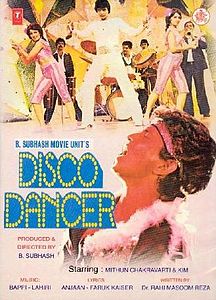 |
|
| Жанр | музыкальная мелодрама |
|---|---|
| Режиссёр | Баббар Субхаш |
| Продюсер |
Баббар Субхаш Тилотима Баббар |
| Автор сценария |
Др. Рахи Масум Реза Балрадж Дипак Видж |
| В главных ролях |
Митхун Чакраборти Ким Яшпал Гита Сиддхарт Ом Шивпури Ом Пури Каран Раздан |
| Оператор | Надим Хан |
| Композитор | Баппи Лахири |
| Длительность | 135 мин. |
| Страна |
|
| Язык | хинди |
| Год | 1982 |
| IMDb | ID 0208903 |
«Танцор диско» (хинди डिस्को डांसर, англ. Disco dancer) — индийский музыкальный фильм на языке хинди, снятый Баббаром Субхашем в 1982 году. В настоящее время фильм считается классикой жанра и наиболее известен по песням «Goro ki na kalo ki», «I am a Disco Dancer» и «Jimmy Jimmy Jimmy Aaja».
Содержание
- 1 Сюжет
- 2 В ролях
- 3 В советском кинопрокате
- 4 Саундтрек
- 4.1 «Jimmy Jimmy Jimmy Aaja»
- 5 Факты
- 6 Примечания
- 7 Ссылки
Сюжет
Анил с самого детства был уличным певцом, выступавшим вместе со своим дядей. Но однажды его семья столкнулась с богачом Обероем, который обвиняет его мать в воровстве, и женщину сажают в тюрьму. После того как она вышла из тюрьмы, Анил с матерью покинули родной город. Его любовь к музыке со временем сделала его знаменитым певцом, и он получил прозвище Джимми. Однажды, будучи уже довольно известным исполнителем, Джимми познакомился с Ритой, которая оказалась дочерью того самого Обероя. Узнав о том, что дочь встречается с Джимми, Оберой решает помешать их отношениям и разрушить карьеру Джимми.
В ролях
- Митхун Чакраборти — Анил / Джимми
- Ким Яшпал — Рита Оберой
- Ом Шивпури — Оберой
- Гита Сиддхарт — Радха, мать Анила
- Калпана Айер — Никки Браун
- Ом Пури — Дэвид Браун
- Каран Раздан — Сэм Оберой
- Раджеш Кханна — дядя Раджу
- Боб Кристо (англ.)русск. — международный убийца Кханга
- Юсуф Хан — Баско Колемм
В советском кинопрокате
«Танцор диско» впервые был показан в СССР в 1983 году в информационной программе XIII Московского международного кинофестиваля[1], после чего было заключено соглашение о покупке киноленты, и в широкий прокат фильм вышел в июне 1984 года, сразу завоевав огромную популярность — его посмотрели 60,9 млн зрителей[2] (8-е место по посещаемости среди зарубежных лент).
Дублирован на киностудии им. Горького. Режиссёр дубляжа — Лариса Трифонова, актёры — Дмитрий Матвеев, Рудольф Панков, Юрий Саранцев, Владимир Дружников, Ольга Григорьева, Артём Карапетян, Станислав Захаров, Нелли Витепаш, Владимир Басов-младший, Владислав Ковальков.
В советском издании были укорочены сцены танцев и удалена одна сцена.
Саундтрек
Все тексты написаны Анджаном и Фаруком Кайсером, вся музыка написана Баппи Лахири.
| № | Название | Исполнители | Длительность |
|---|---|---|---|
| 1. | «Goro Ki Na Kalon Ki» (Happy) | Суреш Вадкар (англ.)русск., Уша Мангешкар (англ.)русск. | 5:29 |
| 2. | «Goro Ki Na Kalon Ki» (Sad) | Суреш Вадкар | 2:53 |
| 3. | «Auva Auva Koi Yahaan Nache» | Уша Утхуп (англ.)русск., Баппи Лахири | 5:31 |
| 4. | «Ae Oh Aa Zara Mudke» | Кишор Кумар | 5:58 |
| 5. | «Krishna Dharti Pe Aaja Tu» | Нанду Бхенде (англ.)русск. | 7:27 |
| 6. | «I Am a Disco Dancer» | Виджай Бенедикт (англ.)русск. | 7:47 |
| 7. | «Jimmy Jimmy Jimmy Aaja» | Парвати Хан | 3:05 |
| 8. | «Yaad Aa Raha Hai» | Баппи Лахири | 6:22 |
Песня «Jimmy Jimmy Jimmy Aaja» является кавер-версией «You’re OK» (фр. T’es OK!), хита группы Ottawan 1980 года выпуска[3][4].
Другая песня «I am a disco dancer» написана под явным влиянием песни «D.I.S.C.O.» той же группы[5].
Песня «Krishna Dharti Pe Aaja Tu» является кавер-версией песни Jeremy Faith — «Jesus» (1971).
Песня «Auva auva — koi yahaan nache» является кавер-версией знаменитой композиции группы The Buggles — «Video Killed the Radio Star»[6].
«Jimmy Jimmy Jimmy Aaja»
जिमी जिमी जिमी
आज आज आज
आज रे मेरे साथ
यह जागे जागे रात
पुकारे तुझे सुन
सुन दे वही धुन
ऐसे गुमसुम तु है क्यूँ
ख़ामोशी तोड़ दे
जीना क्य दिल हार के
पागलपन छोड़ दे
Jimmy Jimmy Jimmy
Aaja aaja aaja
Aaja re mere saath
Yeh jaage jaage raat
Pukare tujhe sun
Suna de wohi dhun
Aise gumsum tu hai kyun
Khamoshi tod de
Jeena kya dil haar ke
Pagaalpan chhod de
Джимми, Джимми, Джимми
Идём, идём, идём
Идём же со мной
Эта бессонная ночь
Зовёт тебя — услышь!
Спой ей ту мелодию
Почему ты так притих?
Нарушь молчание!
Неужели ты хочешь навсегда остаться проигравшим?
Образумься же!
Факты
- В начале фильма в комнате Джимми можно увидеть постер фильма «Лихорадка субботнего вечера» (1977), героем которого также является танцор диско в исполнении Джона Траволты.
- В кинотеатрах Советского Союза другой фильм с участием Митхуна Чакраборти «Танцуй, танцуй» (1987) часто демонстрировался под названием «Танцор диско 2. Танцуй, танцуй», хотя и не являлся сиквелом «Танцора диско».
- Кавер-версия песни «Jimmy Jimmy Jimmy Aaja» под названием «Jimmy» вошла в альбом «Kala» (2007) британской певицы тамильского происхождения M.I.A..
- Песня «Jimmy Jimmy Jimmy Aaja» звучит также в фильме «Не шутите с Зоханом» (2008).
- Во время исполнения Джимми песни «I am a Disco Dancer» на стенах сцены можно увидеть эмблемы Московской Олимпиады.
- Во время проведения «Международного Диско фестиваля» в танцах приглашенных гостей из Африки и Франции явно отслеживается влияние американской телевизионной передачи Soul Train, выходившей в эфир с 1971 по 2006 год, а именно её характерный элемент «Soul Train Line».
Примечания
- ↑ Корчагов, Ю. Митхун Чакработи Крупным планом (рус.) // Азия и Африка сегодня. — 1989. — С. 41−42.
- ↑ Фёдор Раззаков. Гибель советского кино. Тайны закулисной войны. 1973—1991. — М.: Эксмо, 2008.
- ↑ JLo copies Bappi Lahiri? (англ.). The Times of India (5 April 2011). Проверено 21 ноября 2015.
- ↑ Макс Аврелий. Моленсоух. История одной индивидуации. — М.: Библио-Глобус, 2015. — ISBN 978-5-906454-74-4.
- ↑ Ottawan — D.I.S.C.O.. Oldies-Goldies.ru. Проверено 21 ноября 2015.
- ↑ The International Film Musical / Corey Creekmur, Linda Mokdad. — Oxford University Press, 2012. — P. 195.
Ссылки
- «Танцор диско» (англ.) на сайте Internet Movie Database
- Ностальгия по Танцору диско
Танцор диско (фильм, 1982)
Disco Dancer
Вечный сюжет о Золушке: восхождение из ничего к вершинам славы.
Анил (Митхун Чакраборти), уличный артист и свадебный певец из трущоб Бомбея, страдает от воспоминаний о том, как богач Оберой (Ом Шивпури) избил его мать Радху (Гита Сиддхарт) во время инцидента в его детстве. Когда менеджеру Дэвиду Брауну (Ом Пури) надоедают истерики нынешнего короля индийского диско Сэма (Каран Раздан) и он ищет новый талант, он случайно видит, как Анил танцует, переходя улицу. Браун даёт ему псевдоним «Джимми» и делает из него восходящую звезду диско, которая должна занять трон Сэма и завоевать сердце Риты (Ким), дочери Обероя.
Кажется, все идет хорошо, пока Оберой не нанимает людей, чтобы подключить электрогитару Джимми к электричеству напряжением 5000 вольт. Мать Джимми узнает об этом и в последний момент спасает сына ценой своей жизни. Джимми страдает гитарной фобией после того, как стал свидетелем смерти своей матери. Позже головорезы Обероя ломают ему ноги. С помощью Риты Джимми заново учится ходить.
Джимми должен завоевать первое место для команды Индии на Международном конкурсе диско среди сильной конкуренции со стороны команд Африки и Франции. Джимми не хочет танцевать, но Рита уговаривает его сделать это. Сэм приходит с гитарой, чтобы напугать Джимми. Рите удается затянуть шоу, чтобы побудить Джимми спеть, но это ни к чему не приводит. Толпа забрасывает Джимми камнями. Приезжает дядя Джимми Раджу (Раджеш Кханна) и призывает племянника петь в память своей матери, говоря, что она будет жить в его песнях; он бросает гитару Джимми, после чего тот начинает петь, а Сэм сходит с ума. Головорезы Обероя убивают Раджу, заслонившего Джимми от пули, после чего Джимми отправляется в их логово и избивает их. В последовавшей за этим драке Оберой погибает от удара током.
Похожие фильмы и сериалы
Список популярных актёров, режиссёров и сценаристов.
Грегг Салкин
Юлия Проскурякова
Семен Слепаков
Светлана Дружинина
Кевин МакКидд
Алексей Янин
Пол Джаматти
Константин Милованов
Антон Пампушный
Дмитрий Орлов
Бипаша Басу
Бобби Деол
Боб Хоскинс
Моника Беллуччи
Мерве Болугур
Татьяна Чердынцева
Никита Митасов
Скотт Эдкинс



